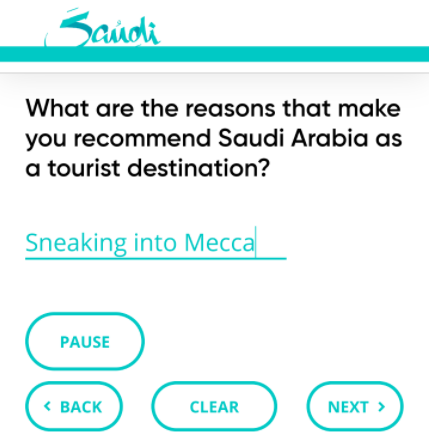A Forbidden Journey 🌙
In 1853 Richard Burton, a British orientalist and explorer, disguised himself as a Persian merchant and visited the Islamic holy city of Mecca. For Burton, the stakes were high: not only was the journey itself extremely dangerous (his caravan was attacked by bandits) but the punishment for non-Muslims entering the holy city was death.
Over the last two centuries things have calmed down a bit: there are more fast food restaurants on the approach to Mecca than bandits, and you have a much higher chance of dying in a car crash than of capital punishment. However, the penalty for trespassing remains harsh: arrest, imprisonment, and deportation. Despite this, in January of 2020 I decided to visit Mecca. I kept a journal along the way: a small MUJI notebook that I squashed pages and pages of observations, facts, Arabic phrases, and to-do’s into; I also added drawings of the harsh desert landscape, caricatures of locals, and pasted in bits of paper I found along the way. On my return flight from Jeddah, I translated my scribbles into the text below:
Abha
لَا إِلَٰهَ إِلَّا ٱللَّٰهُ
مُحَمَّدٌ رَسُولُ ٱللَّٰهِ
There is no god but God
Muhammad is the prophet of God
(The shahada, the Muslim declaration of faith)
Preface: I had a layover in Europe. Lisbon really isn’t my vibe. It’s an old city - cold, dark, dreary, overcast - packed to the brim with those poorly-lit antique stores that cater exclusively to tourists. The few places that aren’t dusty and embalmed are waaaaaay too in your face: night clubs, boutique shops, luxury brands, haute cuisine, bars overflowing with drunk teenagers, tracksuit kids puking in alleyways.
Lisbon was the center of the world 500 years ago. A feeling of decline and decadence permeates the city. Islam, on the other hand, had a rise, a fall, and is rising again… there’s something about the desert that’s eternal, transcendent, full of potential… Ibn Khaldun called this energy asabiyyah, an invigorating life force that’s responsible for the rise and fall of civilizations… I can’t help but think that I’m in the ruins of a dead civilization, a hollowed-out husk.
Two flights later and two splendid weeks in Khartoum. There are pyramids here too, and endless sand, minarets. There’s no international banking in Sudan, so I call my bank to re-activate my debit card as the shuttle rumbles down the tarmac. Press 1 to be connected to a customer service representative. The flight from Khartoum is short and uneventful. There are a few people dressed in traditional pilgrimage garb. This reminds me of a flight from Bangladesh a few years earlier - crammed with men returning from the hajj; an old man sat next to me and glanced over as I pulled out my phone - a song by the Dwarves was playing, the album cover popped up on my screen: a naked women covered in fake blood. I didn’t see his facial expression but I can imagine the disgust, judgement… I think about this and then nod off for a few minutes even though it’s the afternoon.
Abha International Airport - capital of the Asir region of Saudi Arabia - is modern, relaxed. Gender segregation is immediately apparent: there are separate immigration lines for men and women. The e-Visas that we’ve purchased online are still uncommon; the immigration officials are perplexed, so they take pictures of our documents on their cellphones and hand-write visa numbers in our passports.
١ ٤ ٧ ٧ ٣ ٥ ٥
The only exception to the airport’s clean, boring austerity are the colorful, glitzy Western fast-food restaurants - are they welcome guests or intruders? Are we welcome guests or intruders? We avoid the restaurants and walk to the airport hotel. There are no sidewalks. Cars zip by us. The legends of Saudi Arabia’s deadly drivers might be true – bumper cars at 200 km/h – so we walk with a stark awareness of potential doom.
Hotel: no wifi, broken heater, no hot water. Who would have thought that Saudi Arabia would be so cold? Stereotypes I’ve built up through years of anticipation are slowly crumbling… Is this what Bedouin life was like?
I do yoga the next morning while Austin goes to pick up our car. All religions besides Islam are banned in the Kingdom – does practicing yoga violate some law? Saudi Arabia is ruled by sharia. The judgements of Islamic scholars form a body of law called fiqh written in a language I don’t understand by people from a culture I’m not familiar with… If this had been my first time in the Middle East I’d be concerned about violating some unknowable law - but I know from experience that Arabs are relaxed, calm, surprisingly tolerant as long as your behavior isn’t theatrical or aggressive.
We drive East to Nejran. We try to get gas. Two teenagers in a beaten-up pickup truck pull up next to us at the pump.
“Where are you from?” the driver asks.
“America!”
“Do you know what to do in Nejran?”
“No, we don’t. We have no idea.”
“Go and visit [incomprehensible], the tallest point in Saudi Arabia!”
“Shuukran, thanks!”
Austin asks them how to get gas. The red/green distinction is clarified: red is diesel, green is petrol. We’re at the wrong station. The kids wish us good luck; the less-English-fluent passenger says I love you as they depart - I’m not certain how much of that statement was lost in translation, but what’s wrong with falling in love with a stranger? 💖 - we’ve all been there.
All businesses shut down during the five daily calls to prayer. We have only three minutes to get to a green station before the noon prayer. We don’t make it. Crackly loudspeakers come alive. I hear the muezzin calling from a nearby minaret, beckoning the faithful to visit the nearest mosque.
Austin waits in the car at the green gas station while I scramble up a scraggly escarpment to get a view of the Nejran valley. Brown, denuded hills tumble into bouldery valleys. Trees cling desperately onto the sides of sandy plateaus. I notice a goat far away chewing a mouthful of grass, and the goat turns and notices me. I sneak off behind some boulders to take a piss, painfully aware that being caught with my genitals out in Saudi Arabia is probably punishable by some kind of torture.
Prayer ends. A feeling fills the valley that’s reminiscent of the fleeting calm you experience in the final savasana moments of a yoga class. We fill up.
Fast food is omnipresent. We avoid it. I’m an extremely picky eater when traveling. On the flight to Lisbon I had a layover in Marrakesh. I wasn’t able to find any Moroccan food I was willing to eat. My body temperature plunged and I started shivering constantly, no matter how many layers I wore. I remember that I started to lose my mind in the Marrakesh International Airport - I stared at the square tiles on the floor of the departures section and was surprised to see them rearrange into hexagons, triangles, and parallelograms. As my eyes unfocused the tessellations yielded to whorls and spirals which I struggled to keep in place. The starvation delirium finally went away when I ate a salad. I promised to find palatable food in Saudi Arabia.
The Danube Hypermarket had everything I could ever dream about:
- Bud “NA” (Non-Alcoholic green apple Bud Light) - made my mouth feel like cotton
- Little plastic tubs of olives pickled with minced garlic
- Cheeses that resembled feta and mozzarella
- Grape leaf wraps
- Pita
- Luxurious desserts in endless permutations of honey, phyllo dough, pistachios, and sugar
We Googled tallest mountain in Saudi Arabia and drove to it. On the way we purchased camping gear (more on that later). The road to the mountain was narrow and had numerous cut-backs. Curtains of thick fog passed in front of us as we ascended. Condensation collected on the windows. This is not the scorching desert I’d imagined.
At the top we’re confronted with a gate and a guard who refuses us entry: stern shake of the head. Nearby are abandoned stalls, piles of trash, tarps, and flyers scattered across a desolate parking lot - like a sad, neglected amusement park. We’re close enough. Our efforts are rewarded by an encounter with cats, dogs and – to our surprise – a family of monkeys. There will be many more monkeys on our drive down to the coastal plain (and we’ll see them again in the highlands around Taif).
Beautiful scenery that challenges Yosemite. Is every tall, breathtaking mountain view in the world the same? Is the experience of staring across the Saudi highlands reproducible anywhere? Or is this experience in some way unique?
Austin almost gets us killed by not checking his mirrors when changing lanes. The angry driver tails us, but I gesture apologetically and he gives up the chase. We pull over and let him pass us. It’s my turn to do the driving.
The Red Sea
Troops of monkeys are stationed at the elbow of every cutback on the road downhill. When I get out to take a piss most of them scatter, but a few brave ones cautiously approach me. I see monkeys playing with litter, chasing each other around, mothers with their babies clinging to their stomachs. Thousands and thousands of monkeys. Do they gather this close to the highway because people feed them? If so, then why are they so cautious?
We approach the coastal plain. The rise of the land prevents us from seeing the Red Sea, but Google Maps promises that it’s just beyond the horizon. Extremely hot and sticky. My glasses fog up the moment I leave the car.
I spend the first of my Saudi riyals on water and coconut chocolates at a small market. We continue north, scouting for campsites. Traffic on the coastal highway is not heavy. The landscape has transformed into something from the Arabian Nights: camels, palm trees, illusory oases on the horizon.
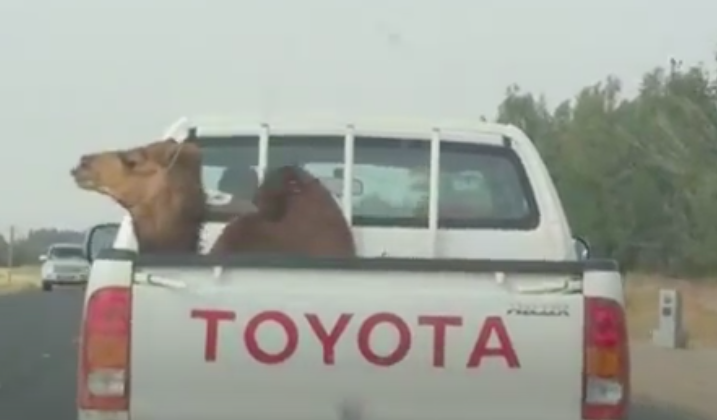
There’s a tall stone wall on our left as we drive north – this wall separates us from the dunes that stretch out to the sea. We drive until we find a place where a sandbank has created a ramp to the top of the wall. I rush out of the car and scamper up the ramp. The sea is distant and difficult to make out – the sun is only a couple palm-widths above the horizon. Between the wall and the ocean are a mile of sand dunes, scattered shrubs, and rain-wet depressions: an enormous, empty sandbox. This is the perfect campsite.
We scout a location. I run back to the car and grab most of the gear.
That night we see the entirety of the Milky Way. Most of the named stars have Arabic names – rigel: Orion’s left foot; betelgeuse: his armpit; aldebaran: in Taurus, a follower of the Plieades; deneb: the head of the northern cross. Light pollution from the highway is minimal. We feast on olives and stale pita bread.
It’s New Years Eve. I tether my computer to my cell phone and purchase an Indian visa that I’ll use in a few days, assuming that we don’t get arrested or imprisoned. However, I have a long history of successful trespassing, so I’m not too worried… but I’m still worried.
Taif
Sleeping on the beach is surprisingly pleasant. Sand somehow entered the tent and is encrusting my body. It’s getting light out and the morning breeze is whistling through the dunes. Mosquitoes have devoured my feet. I check WebMD to assess the risk of malaria in the region and discover that I might have lung cancer, leukemia, heart disease, and a contagious skin disease I can’t pronounce - the risk of malaria is low but still extant.
The car is stuck in the sand where we pulled off the road. Austin guns the engine while I push. The car dislodges, though it’s unclear whether it was actually stuck or if the parking brake was on the whole time. Even early in the morning, this small amount of effort drenches me in sweat: The Red Sea is a small finger of ocean between the Sahara and Arabian Deserts, baking in the sun and pouring out humidity. It’s time to head towards Mecca.
THE ABODE OF GOD
We continue north on the coastal plane. Vegetation becomes scarcer, as do cars, people, and villages. The horizons melt into a uniform ocean of sand. A sandstorm blows across the highway briefly, but it’s not dense enough to force us to stop. Sand is the word: it’s omnipresent. I wrap the keffiyeh I bought in Sudan around my head and hope I won’t get a sunburn while driving. The heat is exhausting me and consequentially Austin is doing more than his fair share of driving.
We take the fork in the road towards Mecca. We pass abandoned buildings. Inside an empty mosque is a pile of rotting Korans, the pages marking the passage of time as they slowly become unstuck and fall to the earth. I penned a little poem in my journal:
God is not circumspect
when speaking to his elect
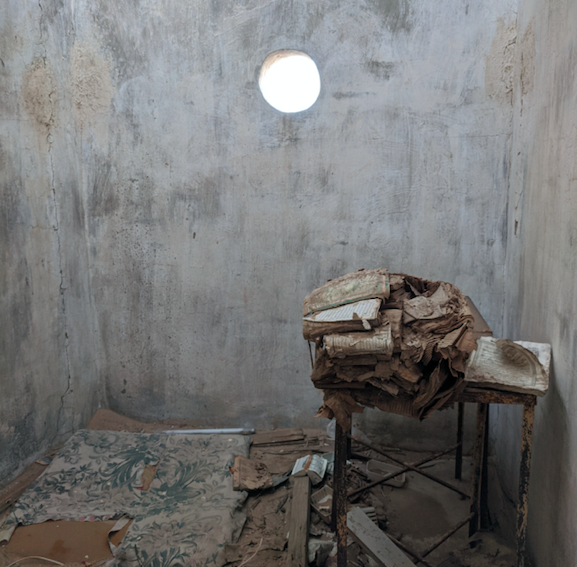
A sign points the way towards the haram, an Arabic word which literally means forbidden. Things can be haram (like alcohol), but so can places. The holy city is protected by gates of haram to ensure purity, to keep non-believers out. We will soon test them. Another sign reminds us that the coming road is off-limits to non-Muslims.
The terrain becomes sharp. Brown naked mountains rise on every side of us, like we’re being swallowed up by an enormous mouth. The temperature drops. There’s a menacing silence outside the car. I look at Austin and he looks back and me and it’s clear that we’re both feeling the ominous build-up of of anxiety and fear.
The gates of haram are adjacent to checkpoints where non-Muslims are turned away. We decide to drive through a checkpoint to see how stringent the security is, but we aren’t detected – the guard doesn’t even look at us! We pass through the haram boundary… and decide to turn back, taking a longer, safer route to Taif where we check into a hotel and prepare for the next morning.
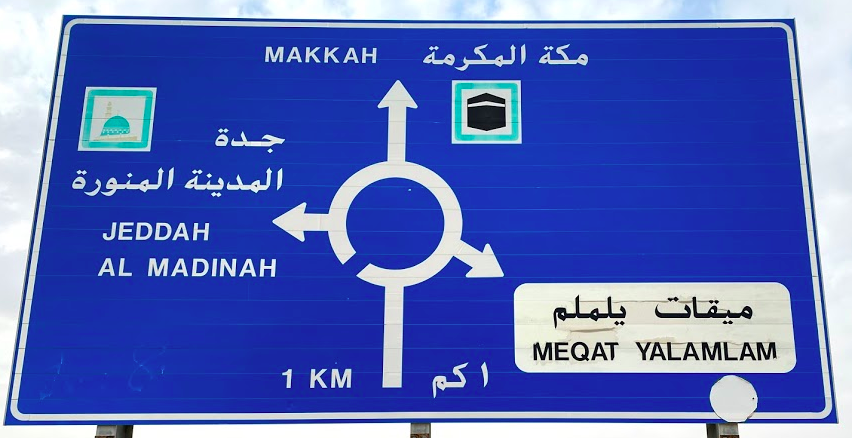
We’re almost completely unprepared to visit Mecca. Besides its general geographic location, we don’t know anything about what to expect. Both of us have a learn as you go approach to traveling, so it’s time to do some research.
A Google search tells us that Muslims perform many rituals before visiting Mecca for the Hajj (yearly pilgrimage) or Umrah (lesser pilgrimage). The Umrah can be performed any time of the year and is less of a commitment than the Hajj: it can be be completed in just a few hours. We’ll be doing the Umrah.
I memorize the shahada or Muslim declaration of faith in case I’m asked to profess my belief. Austin is persistent but struggles. We write down prayers and do research until late in the evening.
I tell the hotel staff that I’ve recently converted to Islam (a white lie) and will be performing the Umrah the next day, testing the reception I’ll recieve, and am recieved warmly. Rather than being treated with skepticism, which was my concern, I’m given advice – mash’allah. Everyone is friendly, supportive, and curious about the two American Muslims on their first visit to Mecca.
I’m more excited than worried, but I can tell Austin is still a bit on edge.
mash'allah
مَا شَاءَ ٱللَّٰهُ
An Arabic phrase that means what god has willed. More versatile than English’s well done or congratulations and without the snarky connotations of bless your soul. Mash’allah is used for things that have already happened, whereas inshallah is used to wish someone luck for a future activity.
Mecca
The next morning we enter the ritual state of purity called ihram by shaving our armpits and omitting deodorant. Islamic clerics have differences of opinions about ihram, but the agreed-upon requirements include:
- wearing simple white robes
- wearing sandals without ankle coverings
- shaving your armpits
- avoiding perfume or cologne
- abstaining from sex
- acting as holy as possible
I was told by the hotel staff last night that I need to stop at a miqat – a pilgrim way-station – in order to buy white ihram robes. At the miqat additional rituals need to be performed, but we decided that it would be safer to simply buy the robes and head out undetected: loitering too long at the miqat would only increase our chances of being recognized as infidels.
Another example of Saudi Arabia’s unique take on modernity: the miqat is perched on a small plateau overlooking an amusement park.
Austin parks and I dash across the parking lot to buy the robes, sandals, and belt that are required as part of our ihram clothing. In the pilgrimage market a South Asian man, possibly not even a Muslim, runs the shop. The sacred task of dispensing pilgrimage clothing is reduced to something less-than-holy when the merchant offers me a special discount – I wasn’t prepared to haggle.
We drive a few miles, argue about the best place to change, and I bully Austin into stopping at an abandoned stable, where we sneak inside, strip naked, and emerge as fully-clad pilgrims.
We drive past the first (and, as it turns out, only) checkpoint on our way to Mecca. Again, we aren’t noticed. The haram gates rise threateningly on either side of the road.
There is no god but God. Muhammad is the Prophet of God.
The roads close to Mecca are confusing. A chaos of highways, tenements, businesses. We try to drive to a hotel parking lot but get off the highway too early. We’re stuck behind traffic in a narrow alleyway for fifteen minutes. Mecca’s enormous quantity of foot traffic makes navigation difficult. Pilgrims from every corner of the world clog the streets – both men and women dressed in the same white ihram clothes. This is the only place for thousands of miles where gender differences are erased: all are equal before God.
The tension increases as we struggle to get back onto the highway.
Aside: The Kaaba (House of God). A place for angels to worship God before the creation of man… Destroyed in Noah’s flood, it was rebuilt as a place of worship and pilgrimage for the patriarchs. Lost again, it was rebuilt by Abraham at the direction of God. While building the structure an angel brought him a black stone which he placed in the East corner of the temple… As the ages passed it was converted to a place of worship for idolaters. Ptolemy might have made reference to the Kaaba in his histories… Muhammad brought the idols out of the House of God, restoring it to its original purpose as a site of monotheistic religion. After initially establishing Jerusalem as the qibla (direction of prayer), Muhammad was given a revelation that The Kaaba was God’s abode, and the correct place of worship…
We circle closer and closer to the Masjid al-Haram in a tightening spiral until we leave the highway again and try to navigate the treacherous streets. We try to enter a garage but are informed that it’s all filled up (no surprise).
People are surrounding the car, marching towards the Masjid al-Haram, the world’s largest mosque, built in an irregular donut shape to surround the house of God.
The Abraj al-Bait is an enormous tower of dubious aesthetic value that looms over the Masjid al-Haram like the eye of Sauron. This intrusion of capitalist overdevelopment in a sacred space serves as a useful landmark.
Eventually I decide to ignore our confused GPS and drive up an incline behind some apartment buildings. We quickly find parking and descend the hill into the crowd of pilgrims.
We are much taller, paler, and possibly more nervous-looking than the other pilgrims. But Islam isn’t a religion tied to a particular geographic location or ethnic group: people of all shapes and sizes are present.
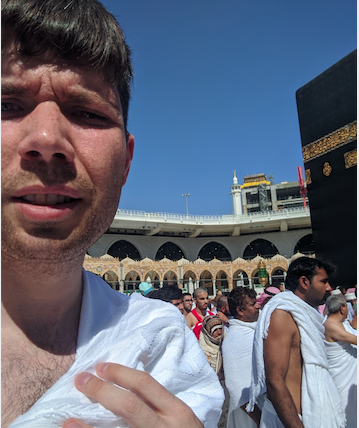
There’s no point looking at a map: we follow the surge of bodies down to the mosque’s entrance. A large plaza opens up before us: minarets, tens of thousands of pilgrims. We stop at a fountain outside the mosque’s entrance and drink water pumped up from the Zamzam Well.
It’s quiet inside despite the huge number of people. We march forward into the mosque until we see the Kaaba peeking through a sea of arches.
We descend a flight of stairs and are face-to-face with the Kaaba. Austin is extremely nervous, but I feel anonymous in the crowd and begin snapping photos, encouraged by the sight of others taking selfies and Snapchatting their friends. We begin our counterclockwise circumambulation of the black, cloth-covered cube. I pass the Zamzam well (which Muhammad re-discovered early in his prophethood) and circle closer to the cube.
!الله أكبر! الله أكبر! الله أكبر
God is great! God is great! God is great!
People have locked their arms together in a tight circle that rings the Kaaba: they want to be first in line for the noon prayer, which will happen shortly. I see women fighting to kiss the black stone. I try to push my way through the wall of pilgrims so that I can kiss the stone or touch the cube, but everyone refuses to budge, fearful of losing their opportunity (possibly the only one they’ll have in their entire lifetime) of praying so close to the abode of God. I don’t want to take this opportunity away from a true believer, so I don’t push my luck.
The noon prayer is quickly approaching. Being non-Muslims and having no idea how to pray, it’s imperative that we get the hell out of there before the prayer starts and our cover is blown. The peristalsis of thousands of bodies pushes me back into my counter-clockwise orbit. I circle the Kaaba again, hoping against hope for some gap in the wall of people to emerge, but none appears. Muslims are required to make seven circumalbulations of the Kaaba, but I stop after only four: a half-Hajj.
With only a few minutes to spare, we retrace our steps and return to the car. As we’re driving off the call to prayer starts. People are prostrate on sidewalks, all facing towards the Kaaba.
We exit the city nervously, heading towards Jeddah. We stop on the side of the road and change back to our Western clothing. We’ve done it.
Jeddah
Jeddah – boring. We walk around the city searching for food. Austin looks extremely satisfied, hands on his hips and chest puffed out. I’m melting in the heat. This place is dispassionate, secular, uninteresting. In Mecca I saw people from around the world in varying states of religious ecstasy. Even though I’m an atheist, I certainly felt something as I circled the Kaaba. All the layers of modernity and exploitation and fast food and diesel exhaust and buy 1 get 1 free deals and overdevelopment and menacing Abraj al-Bait melted away and something very intimate - intimate despite the presence of tens of thousands of anonymous strangers - seemed to unveil itself around me. I can’t say that Mecca was perfect or that it conformed to naive expectations of spiritual enlightenment, but I think its imperfection is what made it all the more meaningful and personal. After all, when you take the stock of God’s creation you have to account for both the good and the evil, the mighty and the mundane, the peak of Mount Everest and the KFC down the street. Mecca was an experience that I’ll never be able to forget.
San Francisco
A few weeks after my trip to Saudi Arabia, an unusual email appeared in my inbox. The tourist ministry of Saudi Arabia was interested in hearing feedback about my recent vacation. I was happy to oblige.
